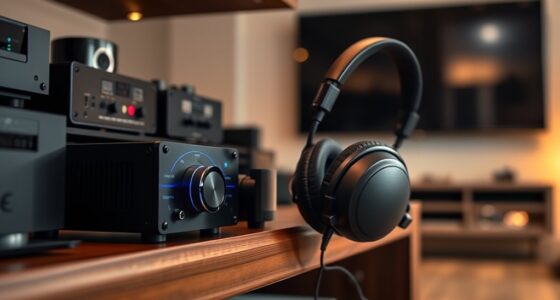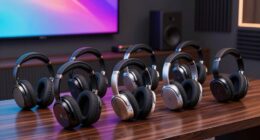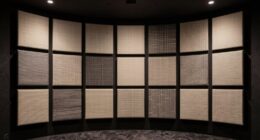Bluetooth codecs determine how your devices wirelessly transmit audio, impacting sound quality, latency, and compatibility. SBC is the default, offering basic sound, while AAC provides better quality on Apple devices. aptX and aptX Low Latency balance high sound quality with minimal delay, perfect for gaming or videos. LDAC transmits more data for richer sound but requires compatible hardware. Lossless codecs aim for perfect reproduction, but support is limited. If you keep exploring, you’ll uncover how to choose the best for your needs.
Key Takeaways
- Bluetooth codecs determine wireless audio quality, latency, and compatibility between devices, affecting user experience.
- SBC is the default codec offering basic sound, while AAC provides better quality, especially on Apple devices.
- aptX and aptX Low Latency balance quality and reduce delay, ideal for gaming and video synchronization.
- LDAC transmits more data for high-resolution sound but depends on hardware support and environmental factors.
- Lossless Bluetooth audio is emerging, providing bit-perfect sound, but requires specialized hardware and is less common.
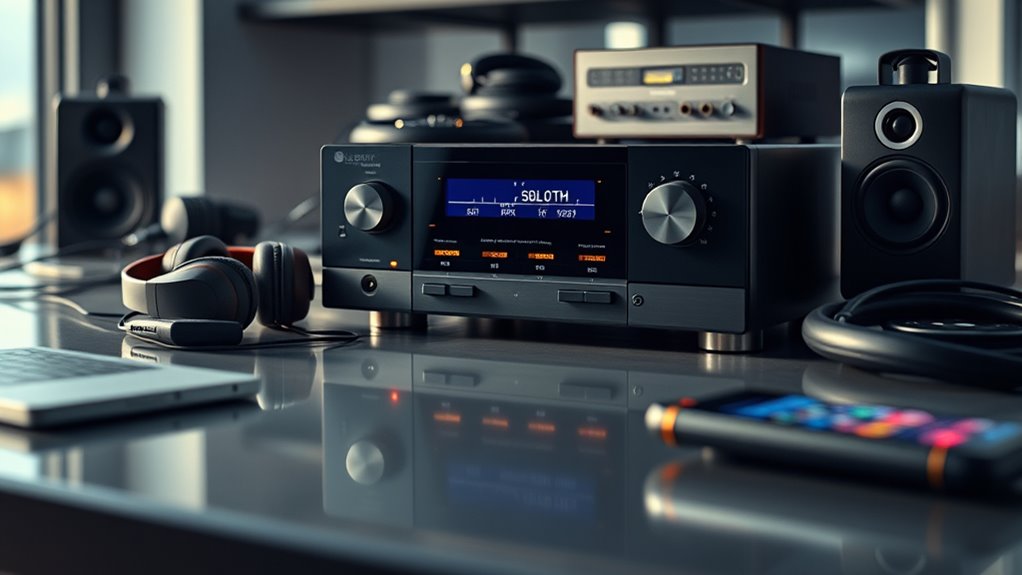
Bluetooth codecs are essential for transmitting audio wirelessly, directly impacting sound quality and connection stability. When you’re choosing a device or headphones, understanding how codecs influence wireless audio compatibility can make a big difference in your listening experience. Different codecs handle data transmission differently, which affects how well your devices communicate and how closely the sound matches the original recording. For example, some codecs prioritize high sound quality, while others focus on reducing latency to improve synchronization, especially for activities like gaming or video calls.
Bluetooth codecs directly impact sound quality and connection stability for wireless audio.
One common issue you might face is codec latency issues. These are delays that happen during audio transmission, which can cause audio and video to fall out of sync or create a noticeable lag when you’re watching content or gaming. Certain codecs, like SBC or AAC, tend to have higher latency, making them less suitable for real-time audio tasks. Conversely, codecs like aptX Low Latency are designed to minimize this delay, providing a more seamless experience when synchronization is vital. Recognizing these differences helps you select devices that match your specific needs, whether it’s high-fidelity music, gaming, or video streaming.
SBC is the default codec in most Bluetooth devices because it’s widely supported and offers decent audio quality for everyday use. However, it’s not the best option if you’re seeking premium sound or minimal latency. AAC, popular among Apple devices, offers better sound quality at similar data rates, but its performance can vary depending on the device and environment. If you’re an Android user, aptX codecs are often a good choice for balancing audio quality and lower latency, especially aptX Low Latency, which reduces lag to nearly imperceptible levels. LDAC, developed by Sony, is another high-quality codec that transmits more data, resulting in richer sound, but it requires compatible hardware and can sometimes be affected by interference.
As you explore different Bluetooth codecs, keep in mind that not all devices support every codec. Compatibility directly influences your wireless audio experience and how well your devices work together. If you’re concerned about codec latency issues, look for devices that support aptX Low Latency or LDAC, depending on your needs. Ultimately, understanding these codecs helps you make smarter choices, ensuring your wireless audio setup delivers the best possible sound quality and minimal delays, no matter what content you’re enjoying.
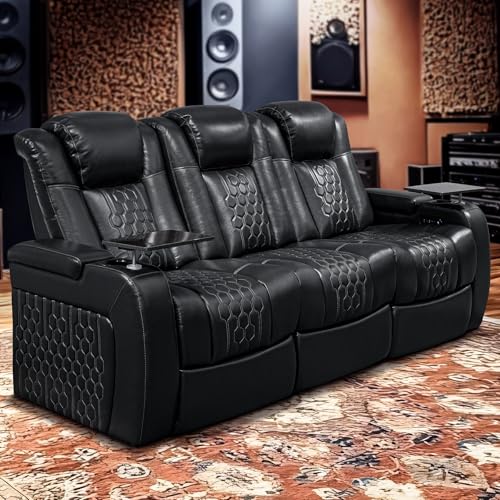
HKUVUKH Home Theater Seating, Living Room, Powered Headrest, Powered Lumbar, Italian Leather, Powered Recline (Black, Row of 3 Console)
Premium Italian Leather: The HKUVUKH Home Theater Seating is crafted from high-quality Semi-Aniline Italian Leather 11000, offering a...
As an affiliate, we earn on qualifying purchases.
Frequently Asked Questions
How Do Bluetooth Codecs Affect Battery Life?
Bluetooth codecs impact your device’s battery life by influencing battery drain and power efficiency. Higher-quality codecs like LDAC or Aptx HD often use more power, reducing your battery life, while SBC is more power-efficient but offers lower sound quality. If you prioritize longer usage, choose a more efficient codec. Conversely, for better sound, you might accept increased power consumption, which affects your device’s overall power efficiency.
Can I Upgrade My Device’s Bluetooth Codec?
Yes, you can upgrade your device’s Bluetooth codec if it supports codec upgrades and is compatible with newer codecs. Check your device’s settings or user manual to see if it allows manual codec selection or automatic updates. Keep in mind, device compatibility is essential; if your device doesn’t support certain codecs, you won’t be able to upgrade to them. Upgrading can improve sound quality but may impact battery life.
Do All Devices Support All Bluetooth Codecs?
Think of Bluetooth codecs like different languages—your device and headphones need to speak the same for smooth communication. Not all devices support every codec; some only support SBC, while others include AAC, Aptx, or LDAC. If your device’s support for certain codecs isn’t compatible with your headphones, you won’t get the best audio quality. Always check your device support and codec compatibility before upgrading or purchasing new Bluetooth gear.
How Does Codec Choice Impact Audio Lag?
Your choice of codec directly impacts audio latency, which affects gaming performance. For minimal lag, opt for codecs like Aptx Low Latency or LDAC, which are designed to decrease audio delay. Higher latency codecs, such as SBC, may cause noticeable lag, hindering your gaming experience. So, selecting the right codec guarantees smoother sound synchronization, giving you a competitive edge and an overall better audio experience during gaming sessions.
Are There Security Concerns With Specific Bluetooth Codecs?
Yes, Bluetooth security can vary depending on the codec you use. Some codecs, like SBC, have known codec vulnerabilities that might expose your device to security risks. While most modern codecs include encryption, it is crucial to keep your devices updated, as outdated firmware can weaken Bluetooth security. Be aware of potential codec vulnerabilities, and choose devices with strong security features to protect your data during wireless transmissions.

Weilianda Chic Top Grain Leather Home Theater Seating Power Headrest Recling Movie Gaming Recliner Sofa with 7 Colors Ambient Lighting, Golden Cup Holder Carbon Fiber Tray Table Row of 3 Black
TOP-GRAIN LEATHER: Weilianda home theater seating is designed to provide the ultimate level of comfort and convenience for...
As an affiliate, we earn on qualifying purchases.
Conclusion
So, after all this talk about codecs, you might think you’re finally tuned in. But here’s the irony: with so many options, you’re still left guessing which sounds best — and often, your ears can’t tell the difference anyway. It’s almost poetic how technology promises perfect audio but keeps us chasing elusive quality. So, enjoy your music, knowing that amidst all the choices, sometimes the best sound is just hitting play.

comfiroom Leather Home Theater Seating Classic Series Dual Power Electric Headrest Game Seats Movie Theater Chairs Theater Recliner Sofa with Type-C USB Charger (Black, Row of 3)
COMFORT COMES FIRST: The Comfiroom home theater sofa is crafted from premium leather, offering a delicate and smooth...
As an affiliate, we earn on qualifying purchases.
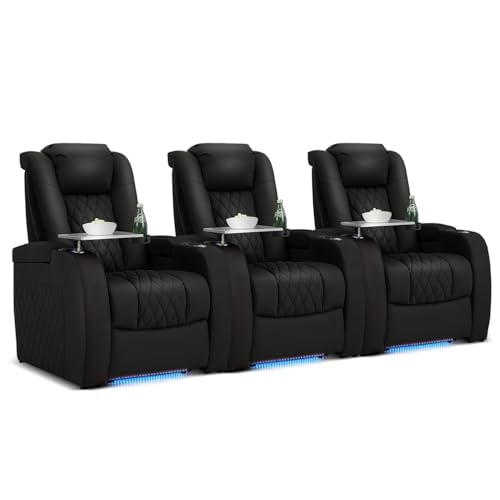
PBRO Home Theater Seating Genuine Leather Recliner Chair, Power Reclining & Headrest, USB A/C Charging Ports, Tray Table, Cup Holder Ambient Lighting Black 3 Set
Home Theater Seating: Designed for immersive entertainment experiences, this home theater seating brings cinema-like comfort to your living...
As an affiliate, we earn on qualifying purchases.








